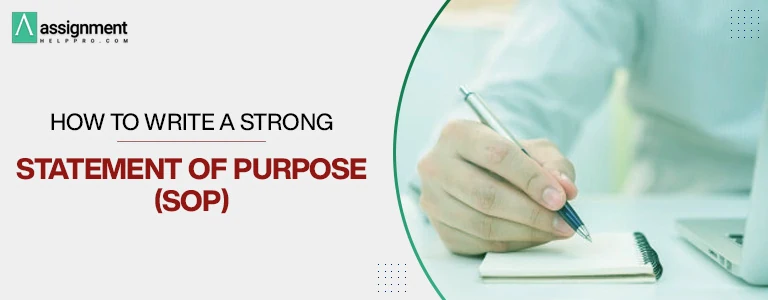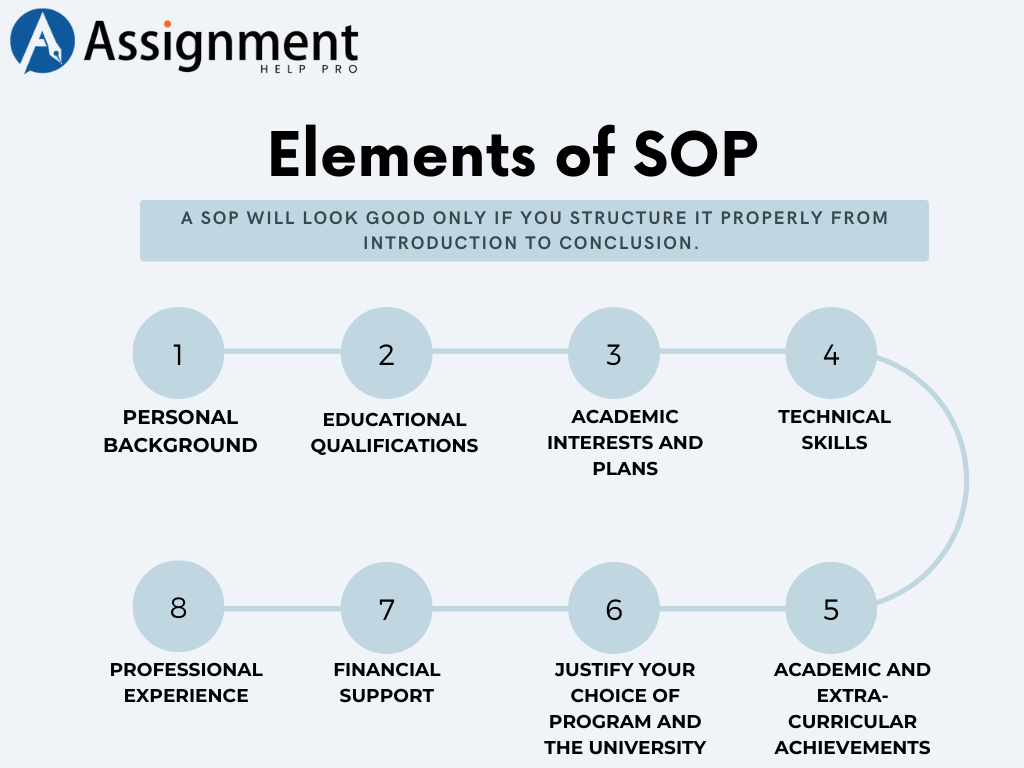Are you a student who wishes to pursue higher education in any reputed college or university? If yes, then before applying for admissions, get to know about Statement of Purpose (SOP). In general, all universities follow different admission procedures for selecting students. However, besides the academic scores and the aptitude skills, some universities also shortlist the students based on the statement of purpose. So, it is mandatory for students to know how to write a statement of purpose effectively. In case, you would like to know in detail about what a statement of purpose means and how to prepare an SOP, then continue reading this blog. Here, you will get complete information about statement of purpose writing.
What is a Statement of Purpose?
At the time of admission, educational institutions require students to submit a personal statement known as a statement of purpose to the admissions committee of a college or university. You should talk about your personality, professional interests, and academic interests in the statement.
In other words, SOP is an essay for an application. You can communicate your objectives and accomplishments to admissions officers and faculty in your field by writing an impressive SOP.
Importance of SOP in the Admission Process
It is believed that the SOP is an essential part of the application process. Universities and colleges use SOP to determine whether applicants are truly interested in taking the course and how well they will contribute to the institution.
Very much like the introductory letter, composing a mission statement will assist you with featuring your assets in the scholarly field and your character. It gives an impression to the admission committee about you. In most cases, the results of entrance exams like the GRE, SAT, and GMAT will be objective, however, the SOP is subjective, and it truly allows you an opportunity to stand unique from the group.
Understand How to Write a Statement of Purpose
Your dream of studying at the top university will happen easily, only if you have an attractive SOP. Remember, as SOP is a part of the application process, the admission committee has all rights to reject your application if your SOP contains any errors or if the essay is not structured properly. So, be careful and write the SOP as specified below.
- Before you start writing the SOP, first do complete research about the course, the list of colleges that offer that course, and the admission process in those colleges. You can write a clear SOP if you know detailed information about the colleges and the courses.
- Decide how you want to present yourself in front of the admission committee. Mainly, the committee will look at your reason for studying a particular course on the first go, and then they will make a decision to select you if they find your answer convincing. So, give utmost importance to the reasons you specify.
- Your personal statement is another key thing in your SOP. Write your personal statement in the form of a story. Don’t be too formal, the content you mention in your SOP about you should be engaging to the readers, and they should find it impressive.
- Specify your educational qualifications and the list of activities that you have done before you apply for that particular course. Never dump unwanted information about you in the SOP. The panel members can easily spot you if you add any false information about you. So, be honest and express yourself in a catchy way.
Tips for Writing a Good Statement of Purpose
If you want your statement of purpose to stand unique in the crowd, then during its preparation, keep the below-mentioned points in mind and follow them accordingly.
- Your SOP should be short and to the point. Maximum, your SOP essay can be written within a word limit of 1000 words. Use simple words, error-free sentences, and a conversational tone to portray yourself. Never exaggerate about yourself because it may spoil the impression your readers have on you. Write the SOP in an active voice.
- Showcase your passion and potential in a convincing manner by mentioning all your recent activities, skills, achievements, and experience. If the selection committee finds your passion genuine, then your chance of getting selected will be high.
- Express what type of person you are by clearly mentioning your strengths and weaknesses. You can also share your failures if there are any. When writing your personal statement, add some uniqueness.
- After you complete writing your SOP, proofread it. Your final draft should not contain any errors. To do a complete revision of your SOP, you can seek help from your professors or any experts.
Read it: Bachelor of Arts in Australia | Find the Best Career Opportunities
Essential Elements of SOP
An SOP will look good only if you structure it properly from the introduction to the conclusion. When you write a statement of purpose, make sure to include the following elements to make your SOP stand unique in the crowd.
- Personal Background
- Educational qualifications
- Academic interests and plans
- Technical skills
- Academic and extra-curricular achievements
- Justify your choice of program and the university
- Financial Support
- Professional experience
- Future career plans
- Hobbies and interests
- Charitable work and community service
Standard Structure and Format of SOP
Not just your academic essay, but your statement of purpose should also be written in a well-structured manner by following a standard structure and format.
In order to structure your SOP in a readable and understandable format, you should write by including the following components.
- Introduction
- Body Paragraphs
- Conclusion
Introduction
Begin the SOP with an appealing story by describing the course you wish to apply for in a particular college. Also, in the introduction paragraph, highlight the reason why you are focused on studying that course. Remember, your introduction should be catchy and hold the attention of the admission committee members immediately.
Body Paragraphs
It is an important section of the SOP. In this section, you should include all the elements of SOP that are mentioned above. More specifically, concentrate on your qualifications, records, work experience, and the activities that you have indulged in the past. All the things you mention in the body paragraphs should be unique, and they must be written in a way to elevates your profile or your admission application to the top position.
Structure and organize your body paragraphs effectively. In the SOP, avoid discussing the points that you have already submitted in your application letter. Your admission committee will reject your application if you keep on repeating the points that you have already discussed.
In the body paragraphs, first, speak about your educational qualifications and the benefits you gained from them, then explain the primary reasons why you are interested in learning the course, and then finally mention other data like honors and promotions. Your SOP will gain more value if you include all your achievements.
Conclusion
Like your introduction, your conclusion segment should also be attractive. In this section, you should let your admission panel know how beneficial it is for you to study that course in their college. While explaining that, you should also specifically inform them how the course will improve your abilities and the quality of your life positively.
Your concluding statements should impress the panel members and should make them provide an opportunity for you to study that course in their college.
Remember, in general, the admission committee of the university or college will not evaluate your SOP completely based on your writing skills. Therefore, while preparing an SOP, give more importance to your personality, passion, and potential. Moreover, your statement of purpose should vibrantly define who you are and your study interests.
Initially, you may find it difficult to create your statement of purpose. But, if your passion for the field of study is true and know the insights of SOP preparation, then you can effortlessly compose a statement of purpose. Always keep in mind that writing an SOP with a high level of passion will obviously help you in getting admission to the college and course of your choice.
Final Words
We hope you are now clear about what SOP means and how to write it. Basically, there are no strict guidelines for writing a SOP. So, you can create a statement of purpose in your own writing style by following the tips mentioned in this blog post. In case, you are unsure how to compose a statement of purpose, reach out to us quickly and get assistance from our skilled SOP writers. Based on your specifications, our professionals will prepare and deliver an outstanding statement of purpose worthy of getting admission to the course in the college or university that you desire to join. Note that, even after admissions, for all kinds of academic work on any subject, you can receive our best assignment help in Canberra and boost your overall academic scores.
1. What do you write in a statement of purpose?
To write a statement of purpose, begin with your introduction, summarize your undergraduate and graduate studies and career, state the activities you are engaged in, and finish it with your academic interests.
2. What is meant by a statement of purpose?
Statement of purpose or SOP is the decision maker of a candidate to smoothen his or her place in any academy by giving a clear idea of themselves, their career, studies, and interests.
3. How do you write a good SOP?
To write a good SOP, write your introduction at the beginning, then write about your undergraduate and graduate studies, work experiences, the activities you are engaged in, and your achievements, and include your academic interests in the end.






